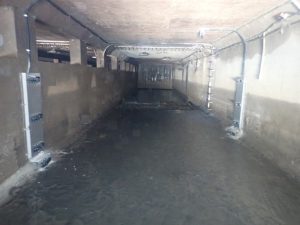When considering building material manufacturing, maintaining optimal moisture levels is crucial for ensuring the quality, durability, and performance of the end products. Whether dealing with sand, gravel, quartz, powder-sand, bricks, ceramics, or plaster, accurate moisture measurement can significantly impact the manufacturing process and the final outcome. The Humy-301 moisture meter is a device designed to offer precise and reliable moisture monitoring and is suitable for a wide range of applications.
Why are Moisture Measurement Instruments Important?
Moisture content can influence the physical properties of building materials in numerous ways:
- Structural Integrity: High moisture levels in materials like the raw materials of bricks and ceramics can lead to warping, cracking, or swelling, compromising the structural integrity of the finished product.
- Durability and Longevity: In materials like concrete, which is often composed of sand and gravel, improper moisture content can affect curing times and lead to issues like cracking or reduced strength, ultimately impacting the material’s durability and longevity.
- Aesthetic Quality: For finishing materials such as plaster, the right moisture levels ensure a smooth application and prevent defects like bubbling or peeling.
- Mold and Mildew Prevention: Excessive moisture in materials like powder-sand and plaster can create a breeding ground for mould and mildew, which not only affects the material’s performance but also poses health risks.
Given these critical factors, manufacturers need accurate tools to monitor and control moisture levels throughout the production process.
Introducing the Humy-301 Moisture Meter
The Humy-301 moisture meter offered by Semrad is a moisture analyser specifically designed for industrial applications. Here are some key features that make it an essential tool for building material manufacturers:
- High Precision: The Humy-301 offers accurate moisture measurement, ensuring that manufacturers can maintain the optimal moisture levels required for their specific materials.
- Real-time Monitoring: This device provides real-time moisture monitoring, allowing for immediate adjustments during the manufacturing process. This capability is particularly beneficial in preventing defects and ensuring consistent product quality.
- Versatility: The Humy-301 is suitable for a wide range of materials, including sand, gravel, quartz, powder-sand, the raw materials of bricks and ceramics, and plaster. Its adaptability makes it a versatile tool in diverse manufacturing environments.
- User-friendly Interface: The device features an intuitive interface, making it easy for operators to use without extensive training. This user-friendly design helps streamline the manufacturing process and reduce downtime.
- Durability and Reliability: Built to withstand harsh industrial environments, the Humy-301 is both durable and reliable, ensuring long-term performance and minimal maintenance.
Applications for Moisture Measurement in Building Material Manufacturing
The Humy-301 can be integrated into various stages of the manufacturing process to enhance efficiency and product quality:
- Raw Material Inspection: Before materials like sand, gravel, quartz, and the raw materials of bricks and ceramics enter the production line, the Humy-301 can be used to check their moisture content, ensuring only materials with the appropriate moisture levels are processed.
- In-line Monitoring: During production, the Humy-301 can provide continuous moisture measurement for materials such as powder-sand and plaster, allowing for real-time adjustments and preventing moisture-related issues from arising.
- Quality Control: After production, the device can be used for final inspections of materials like plaster and ceramics, ensuring that the finished products meet the required moisture specifications before they are shipped to customers.
Conclusion
In building material manufacturing, precision and consistency are paramount. Moisture meters offer a reliable solution for monitoring and controlling moisture levels, ultimately contributing to higher-quality products and more efficient production processes. By integrating advanced tools like the Humy-301, manufacturers can better manage moisture-related challenges and enhance their overall operational performance.
For more information on the Humy-301 and how it can benefit your manufacturing process, visit the product page or contact us.






